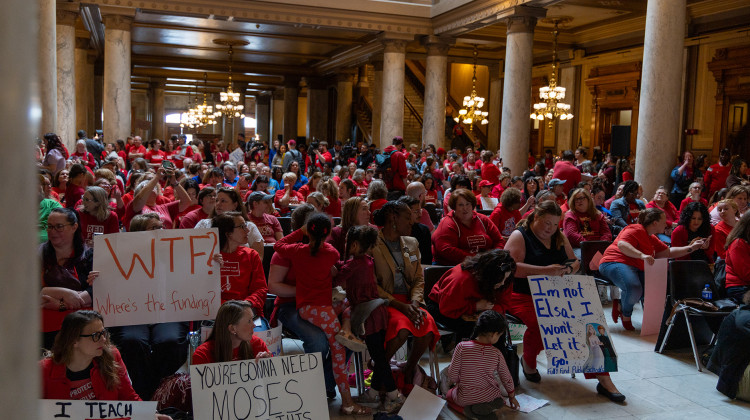The U.S. Supreme Court is expected to release a ruling on the use of affirmative action in higher education this month. Katharine Meyer, a fellow with the Brown Center for Education at the Brookings Institution, says the ruling could have sweeping implications for college admissions. WFYI’s Sydney Dauphinais spoke with Meyer about what schools and students could expect in a post-affirmative action era.
Sydney Dauphinais: If they do decide to overturn affirmative action, how would that impact large state schools as well as selective institutions?
Katharine Meyer: The impact is going to be a little bit different depending on the institution. Not all public universities even engage in selective admissions. And so at those institutions, there may be sort of very little impact on the admissions processes. There are a lot of schools, even sort of in the state system, that admit virtually all the students who apply – and so they don't really get into this question of considering race on the margin. Now, for even moderately, up to the very highly selective institutions, we're going to see a difference in how admissions officers are reviewing applications.
Obviously, the details of the decision are yet to be determined. And who knows – it could be that the Supreme Court upholds the use of affirmative action. But I think most are expecting that there will be at least some severe restrictions, if not a complete ban, on the consideration of race. And so at those institutions, they're going to be thinking about – how do we change our overall review, to still achieve the goals that we have for diversity and incoming class.
Dauphinais: Thinking about how universities are going to be expanding their recruiting practices, how could this change where students decide to go to school?
Meyer: So students, obviously, are going to kind of apply to institutions where they feel like they're going to thrive and to succeed. And so part of that is on institutions to present themselves, hopefully, in a very honest way, as a place that's going to be welcoming for all students. Part of that is conveyed through some of this high school outreach, or connections with counselors or doing individual outreach to students saying, ‘hey, this is a place that we think you belong, and where we want your voice and your perspective’. A lot of it is also highlighting what services are available at institutions after students enroll. And so pointing to affinity groups that they have – or clubs, or associations where students are going to feel like they can find a community, once they're on campus – is going to be really important to making students feel like this is a place I want to go.
I don't know if this is kind of where we want to go – I think one thing that's particularly concerning about the timing of the affirmative action decision is that it comes at a time when a lot of states are considering bills that would effectively ban a lot of these services on campus. So if we think about the swath of bills in majority Republican legislatures that are targeting diversity, equity and inclusion initiatives on campus that sometimes go as far to ban all university spending on DEI initiatives, that's going to make it a lot harder for colleges to say this is a welcoming place. Because they won't be able to offer those services.
Dauphinais: It’s likely to affect more than just admissions into the university more broadly. Can you touch on some examples?
Meyer: I think there are kind of two mechanisms where the decision could kind of have a ripple effect into other services. One is just this uncertainty effect where it can be very difficult then for institutions to know whether or not a practice is in compliance with whatever the court decides. And so there's going to be a lot more effort on the institutions to go through every single one of their programs, whether that's an outreach program or a targeted financial aid program to certain students, and certain backgrounds, or some sort of a, you know, welcome orientation event to make sure. Even if those are very clearly not part of the decision, there's going to be the extra effort of trying to go through each program. And some institutions may decide it's just too complex to figure out whether or not this is acceptable and just decide, we're not going to do that program.
Dauphinais: What do you anticipate the timeline is to start seeing the impacts of this ruling?
Meyer: It’ll be immediate. Institutions are going to have to comply immediately in the fall. There will be no effect on the students who are admitted during the spring of 2023, first starting in the fall of 2023. But really all applications going forward. So for the fall 2023 term, as applications start rolling in for the subsequent year, or if you're an institution that does sort of term by term enrollment – it's going to start immediately on the admissions process.
Contact WFYI economic equity reporter Sydney Dauphinais at sdauphinais@wfyi.org. Follow on Twitter: @syddauphinais.
 DONATE
DONATE







 Support WFYI. We can't do it without you.
Support WFYI. We can't do it without you.